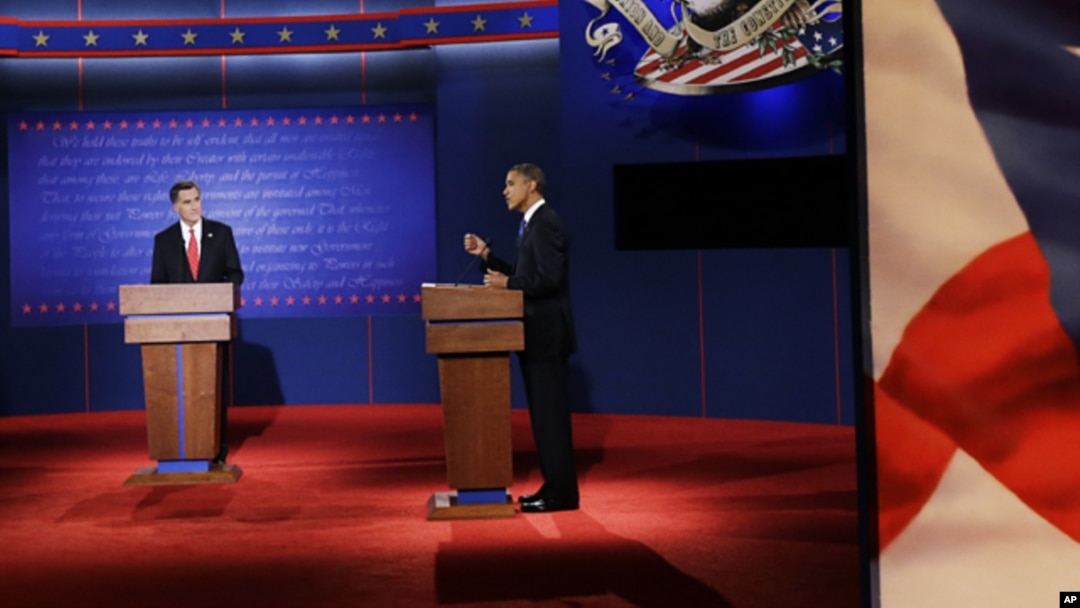WASHINGTON —
U.S. President Barack Obama and former Massachusetts governor Mitt Romney have accused each other of misrepresenting the facts in their first U.S. presidential debate late Wednesday - and fact-checkers have found errors in both candidates' remarks.
Romney, the Republican nominee for the presidency, said during the debate that 23 million people are "out of work" in the United States. Experts say 12.5 million people were officially classified as unemployed in August, the most recent month for which statistics are available. An additional eight million people were working only part-time because they couldn't find full-time work or because business conditions were poor. And an additional 2.5 million are "marginally attached" to the job market: meaning they have quit looking for work because they have health problems, transportation issues, or have simply lost hope. Analysts say a more accurate description of the 23 million people Romney describes would be "underemployed and unemployed."
But Obama, too, took liberties with his jobs numbers, saying five million private sector jobs have been created over the past 30 months. The Bureau of Labor Statistics shows 4.4 million jobs have been created during the Obama administration, but the president did not note that during the early part of his term, the nation lost 4.3 million jobs. BLS statistics say the net gain in jobs since Obama became president is only 125,000.
Romney criticized Obama's health care reforms, saying as many as 20 million people will lose their health insurance as a result of the new plan. But the Politifact research organization notes that the figure, which is from the Congressional Budget Office, says the Romney campaign picked the most extreme of several estimates and notes that the figure would include a number of people who left their plans voluntarily for better health plans.
These are just a few of the candidates' assertions that experts have been examining for accuracy.
But the candidates were not the only ones jumping to conclusions during the debate. A throwaway line by Romney sparked panic among the lovers of Big Bird, a popular character on the children's show "Sesame Street." Romney said to cut costs he would get rid of the federal subsidy for PBS, the network airing "Sesame Street," even though, he said, "I love Big Bird."
News that Big Bird was in peril spread throughout social networks. PBS released a statement Thursday about the importance of public broadcasting. "Sesame Street's" executive vice president Sherrie Westin spoke to reporters Thursday, assuring fans that the show itself receives very little funding from the government - and thus, Big Bird's future is secure.
Romney, the Republican nominee for the presidency, said during the debate that 23 million people are "out of work" in the United States. Experts say 12.5 million people were officially classified as unemployed in August, the most recent month for which statistics are available. An additional eight million people were working only part-time because they couldn't find full-time work or because business conditions were poor. And an additional 2.5 million are "marginally attached" to the job market: meaning they have quit looking for work because they have health problems, transportation issues, or have simply lost hope. Analysts say a more accurate description of the 23 million people Romney describes would be "underemployed and unemployed."
But Obama, too, took liberties with his jobs numbers, saying five million private sector jobs have been created over the past 30 months. The Bureau of Labor Statistics shows 4.4 million jobs have been created during the Obama administration, but the president did not note that during the early part of his term, the nation lost 4.3 million jobs. BLS statistics say the net gain in jobs since Obama became president is only 125,000.
Romney criticized Obama's health care reforms, saying as many as 20 million people will lose their health insurance as a result of the new plan. But the Politifact research organization notes that the figure, which is from the Congressional Budget Office, says the Romney campaign picked the most extreme of several estimates and notes that the figure would include a number of people who left their plans voluntarily for better health plans.
These are just a few of the candidates' assertions that experts have been examining for accuracy.
But the candidates were not the only ones jumping to conclusions during the debate. A throwaway line by Romney sparked panic among the lovers of Big Bird, a popular character on the children's show "Sesame Street." Romney said to cut costs he would get rid of the federal subsidy for PBS, the network airing "Sesame Street," even though, he said, "I love Big Bird."
News that Big Bird was in peril spread throughout social networks. PBS released a statement Thursday about the importance of public broadcasting. "Sesame Street's" executive vice president Sherrie Westin spoke to reporters Thursday, assuring fans that the show itself receives very little funding from the government - and thus, Big Bird's future is secure.




